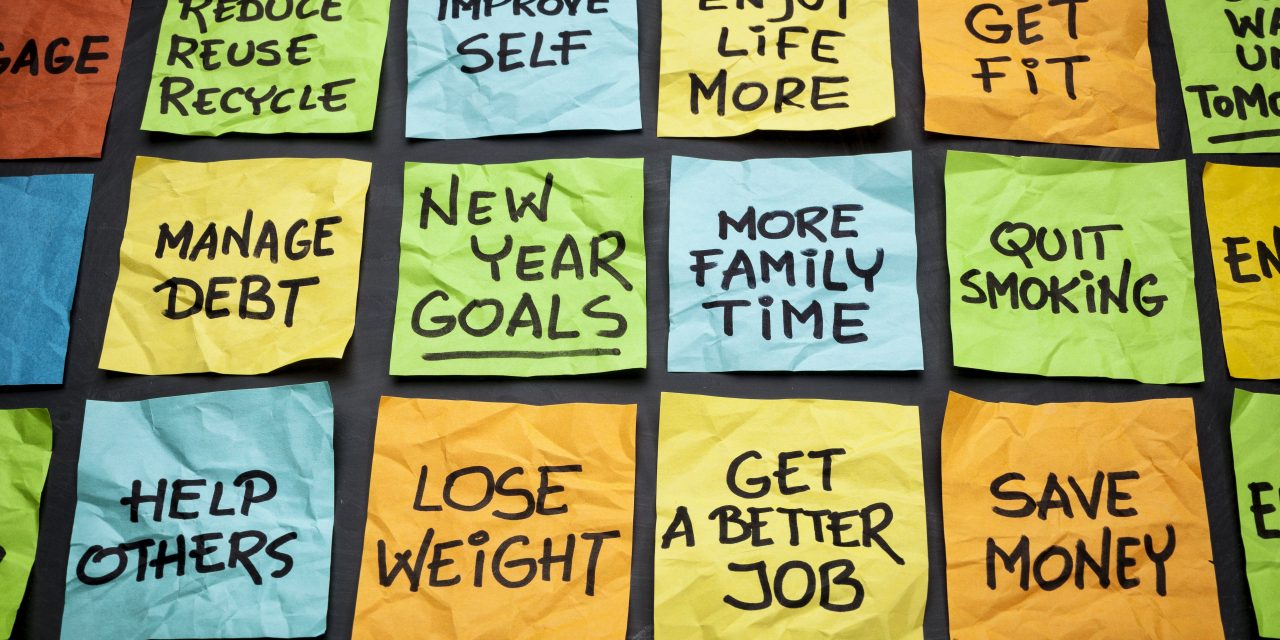Why is it that only 10% of the population stick to their resolution?
It’s that time of year again. A time for fresh hope and renewed optimism, a time when the troubles of the previous twelve months can be cast aside and a clean slate with an abundance of opportunity is presented to us. It’s January, it’s 2018 and it’s time to hit the reset button and ‘start’ again.
As we say goodbye 2017 and hello to 2018, it is out with the old and in with the new. Everyone is extra motivated for more success and greater productivity in their lives. Gym memberships spike, children are disappointed as their tasty fries are replaced with healthy salad dishes and everyone you meet tells you that this is the year….‘their year’, a ‘new year, new me!’. At least that is how it is supposed to be. But after a short time, reality tends to bite back and we usually find ourselves resorting back to our familiar ways.
So, what can we do in order to prevent this common theme from reoccurring once again and how can we make 2018 the year where we achieve greater success than ever before?
Planning
“By failing to prepare, you are preparing to fail.” (Benjamin Franklin)
I am sure many of you have heard me say this before. But, planning is essential and the devil really is in the detail. As Malcolm X famously stated, “The future belongs to those who prepare for it today.” So, think about what it is you want to achieve this year, something that resonates fully with you and then zero in on it. Get specific and set definite goals with clear expectations and objectives. This is vital for you and can be the difference between sticking with a resolution or not. Obtaining clarity and determining exactly what it is you want to achieve and how you are going to do it brings your visions into clearer focus and enhanced perspective. Thus, allowing you to focus on the important matters that will propel you towards your goals and avoid wasted time, effort and energy. Something Peter Drucker highlighted when he wrote, “There is nothing so useless as doing efficiently that which should not be done at all.”
Also, remember the importance of planning if your objective involves outside input. By presenting clarity of objectives and expectations you are allowing for active engagement and increased participation and ownership from others as they are aware of exactly what is expected.
When sitting down to plan ahead, I find looking back and reassessing extremely enlightening. Joel Osteen emphasised the significance of our own personal journeys by stating, “You are not defined by your past. You are prepared by your past”, a point worth remembering. Even if it was a negative experience, it is likely that there is something to be learned from it. Looking into our past can also bring to the fore things that need to change and can allow us to identify the barriers that are keeping us from achieving – in particular the common excuses that keep reoccurring.
A quick look back can cause a shift in perspective that can heed significant improvements in our results. After all, the mind is a powerful tool – ‘are you aware of how strong you and your mind really are?’
So be sure to get stuck into the details and remember that, “Definiteness of purpose is the starting point of all achievement.” (W. Clement Stone)
The Importance of Routine
“Discipline is the bridge between goals and accomplishments.” (Jim Rohn)
The reason for many resolutions failing is because our will and desire simply isn’t strong enough – we aren’t fully committed to achieving the goal. Simply put, resolutions just aren’t enough. What is needed is a conscious decision to make a lifestyle choice and an awareness that what we are working towards will take time, passion, commitment and energy to achieve, along with a lot of hard, smart work and awareness to constantly reassess and reanalyse how we are progressing. Remember, very few things change overnight and it generally takes time. Unfortunately, a lot more time than we would like it to.
This is where the importance of routine comes into play. By creating a routine that works for you and sticking to it you create consistency and this is what will keep you going. By starting right, you are setting the tone for the year to come. Don’t wait for motivation to strike you as it is likely that you’ll be waiting a long time. It usually takes implementation and action to get you going and generate the motivation required for consistent and ongoing growth.
In order to do this, it’s vital that we understand and appreciate the important role that habits and routine play in our day to day lives.
If we think about it, most decisions that we make during the day aren’t actually decisions at all. Although we think we may be deciding on whether to take a certain route of action over another, what we’re actually doing it acting on autopilot. The vast majority of our decisions are made subconsciously and are founded in habits and routines, engrained in us over time through something known as the Habit Loop – a ‘cue’, ‘trigger/routine’ and ‘reward’ cycle. Take the time to observe your environment and the cues that trigger certain routines and focus on the craving or rewards that cause this. If they are positive cycles, fantastic. But, if they are negative think about how these can be changed.
For those interested in finding out more about how habits are developed and perhaps more importantly, how they can be altered, I’d highly recommend The Power of Habit, by Charles Duhigg. In his book, Duhigg writes about the Habit Loop and understanding how our environments impacts our actions and the overall impact habits have on our day to day lives.
So, is there a negative habit that has formed in your life that needs changing?
Discipline (or lack of), shapes your world.
If we fall behind early on, no matter how hard we work, it is difficult to make up that ground. So, start right and be consistent. Stay ahead of the game and don’t back yourself into a corner by easing off too much for a period of time. This is not to say you can’t have time to relax and re-energise. But if we view our days as a fuel tank starting at 100% and diminishing in fuel as the day progresses and understand that we can only ever give 100% per day we will start to see how much we are leaving on the table. For example, if I give only 75% today, assuming that tomorrow I will make up for this by giving 125%, I am fooling myself. My fuel tank will only ever accommodate for 100%. My energy, commitment and motivation is finite and is to be respected and utilised appropriately. Once a day is gone, it is gone forever.
What are you willing to sacrifice and commit to in order to better yourself this year?
Little by Little: Don’t Overdo It!
“A journey of a thousand miles must begin with a single step.” (Lao Tzu)
One of the main reasons that New Year’s resolutions tend to fail is that the change or improvement we seek is too large or too far removed from where we currently are. For example, the old cliché of wanting a beach body, but quitting the gym after only six weeks because we haven’t seen any significant change. Many of us are impatient and set unrealistic time frames on our ambitions. In effect, we don’t play the long game. Remember, little and often.
Always wanting more appears to be a human trait that can lead to a lack of contentment. Personally, I don’t see a problem with wanting more. As long as you show gratitude for what you already have and apply careful consideration of how you are going to work towards achieving your next ambition. I feel the lack of contentment comes from setting unrealistic targets and time frames e.g. becoming a millionaire in three months. It is possible, but highly unlikely and for some, when this doesn’t happen they become despondent and give up.
A word of caution would be not to EXPECT. In particular, not to expect too much, too soon. In order to avoid this, it is vital to focus on the things that you can control and have the power to change now. By doing this we avoid overwhelm and disappointment.
“There’s no such thing as an unrealistic goal, just an unrealistic deadline.” Dan Sullivan
Respect the approach and learn to value and enjoy the journey.
One way of doing this is breaking the year into quarters. Break your larger goals down into smaller and more manageable increments, e.g. quarters and focusing on what needs to be done in the next twelve weeks to move you towards your longer term, bigger picture vision. By breaking large goals into smaller more realistic increments we are more likely to stay motivated, stay on track and work towards our goals. It also allows for the utilisation of reverse-engineering and the ability to see exactly what needs to happen next. Always evaluate and analyse in order to plot the best route to your success.
The little and often approach is also conducive to creating substantial habits as discussed in the previous section, which if positive are beneficial in the long run.
Always Keep Going
“Experience is what you win when you lose.” Unknown
Finally, always keep going and remember why you started! If you imagine it is now December 2018 and you are looking back on your year, where do you want to be and what do you want to have achieved?
Think about how you view mistakes? It is inevitable that there will be setbacks and days when we don’t feel like doing anything. But, don’t quit too soon! It is essential that you always get back up and keep going.
By utilising vision boards or reinforcement of how we want our life to look at the end of 2018 we can stay motivated, play the long game and remember what it is you are working towards.
If you want something different this year, you’re going to have to do something new. Think about how you react to adversity and when things go wrong and utilise this experience to propel you into 2018 with a bang!
In closing, if we are to achieve our ambitions for 2018 we have to take action. Making plans for the future can be a fun and fulfilling process. However, if we don’t follow through, implement and take action we are likely to find ourselves in the same position this time next year! We run the risk of life passing us and in the words of the late John Lennon, “Life is what happens to you when you’re busy making plans.” So, maybe 2018 should be the year we finally start living and experience life.





